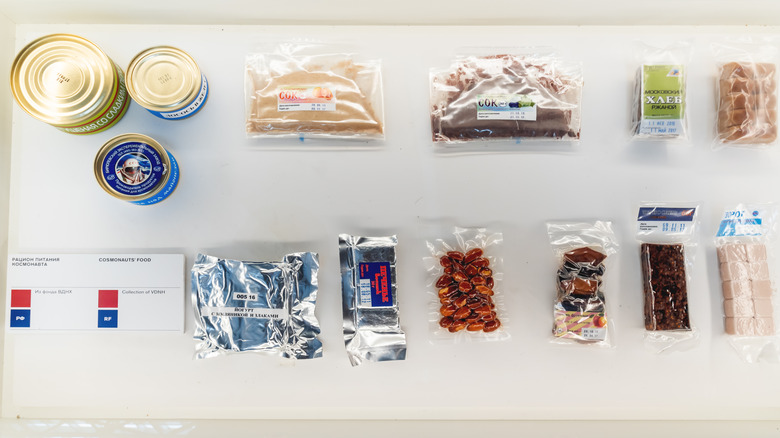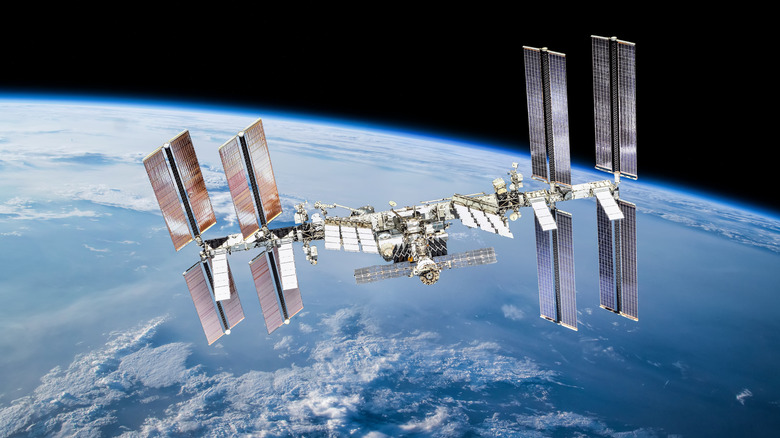The Challenges Astronauts Face When Preparing And Eating Food In Space
Anyone who's packed for a camping trip before knows that food preparation becomes a major challenge when you lose the luxuries of a modern kitchen, such as refrigerators, freezers, and ovens. Maybe you've got room to pack a hot plate or camping stove, but even then you'll be restricted to fry or canned foods. It can be frustrating to plan a menu with these restrictions. Now imagine doing it in zero gravity.
Well, it's not exactly zero gravity, as scientists are quick to point out. NASA explains that you can never really escape the force of gravity. On the International Space Station (ISS), roughly 200 miles above the Earth, you still have 90% of the gravity you'd have on the surface. Things only appear weightless because the station is in a constant state of free fall, going just fast enough to prevent crashing down to Earth. It's the exact same force you experience on the drop of a roller coaster, except it never ends. According to the European Space Agency (ESA), even though the ISS has nine-tenths of the planet's gravity, it feels like one ten-thousandth. Scientists call this "microgravity," and since they're well-known sticklers for detail, we will too.
As you can imagine, cooking and eating in this environment is quite the challenge.
Floating food
There are some obvious problems with microgravity, namely the issue of food floating away. Salt and pepper are great examples. NASA uses them in liquid form because the dry grains would float out of the shaker, clogging air vents, equipment, and astronauts' eyes. You can't eat bread in space because the crumbs would float away, so astronauts must use tortillas, according to the Kennedy Space Center. The reason liquids, like beverages or salt and pepper solutions, are fine to use is that they stay bound to their packaging through surface tension.
Other problems posed by microgravity are less obvious. One of the biggest challenges in preparing food for astronauts is that you cannot have refrigerators in space, per the University of Colorado. The backside of a refrigerator is hot, and hot air doesn't rise in microgravity. Any heat given off by the fridge would pool in one place, creating a very hot environment where equipment could overheat and break down. You can't leave perishable food at room temperature for more than a couple of hours, so NASA says they have to freeze-dry or dehydrate most food.
Even stranger is microgravity's effect on taste. The Kennedy Space Center explains that astronauts are constantly congested because their sinuses can't drain without the pull of gravity. Consequentially, astronauts have a reduced sense of smell, which makes food taste bland and in need of heavy seasoning. However, reduced tasting power would have been a blessing in the early days of space dining.
New horizons in space food
Subsisting solely on freeze-dried or dehydrated foods might seem like a drag, but it's a tremendous improvement over the earliest astronaut meals. When Soviet cosmonaut Yuri Gagarin became the first human in outer space in 1961, he was given pureed meat in a toothpaste tube and a bit of chocolate sauce for dessert (via Discover magazine). There have been some major improvements since those days.
Astronauts now have an oven for heating meals and in 2019, they made the first baked goods in space which, according to Smithsonian Magazine, were chocolate chip cookies. However, they only did so to test baking conditions in space and didn't get to eat the cookies. If they do become a staple of space flight, the crumb question will need to be addressed.
Meanwhile, famed French chef Alain Ducasse, who can claim more Michelin stars than anyone else, partnered with the ESA to create gourmet meals that astronauts can enjoy on special occasions like birthdays. The menu offerings included swordfish, duck breast, and quail. Perhaps most exciting is the work currently underway at the University of Colorado, where they are on the verge of completing the first space refrigerator. With advancements like these, dining in space could soon be much more palatable, though it might lose some of that otherworldly charm.


